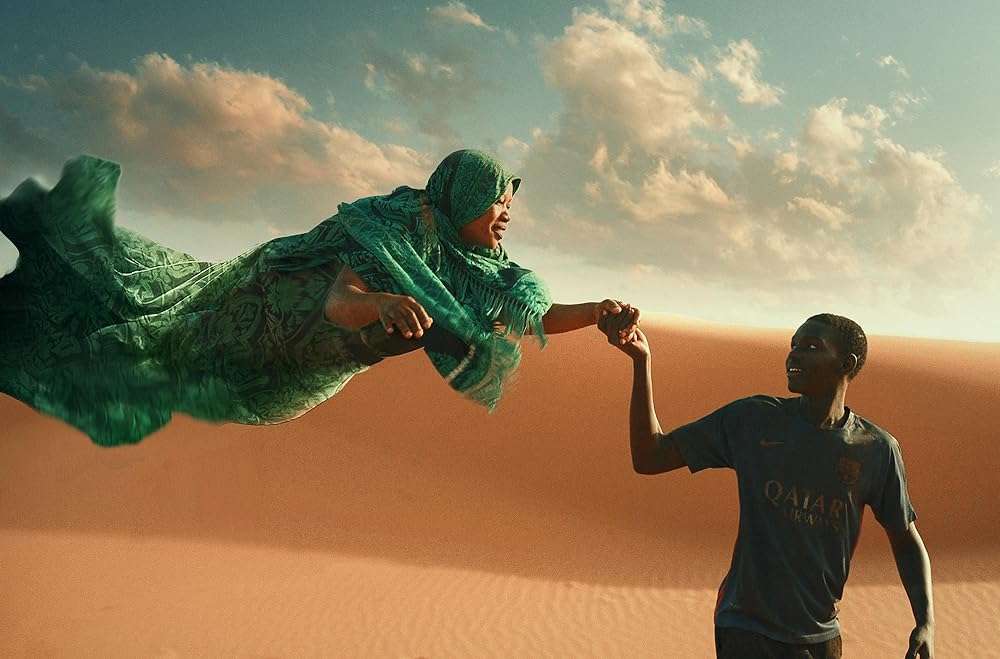There’s a well of tragedy underlying Matteo Garrone’s latest, Io Capitano. The director mines a heart-pounding suspense from the naivete of the sixteen-year-old protagonist, Seydou (Seydou Sarr), as his incredible optimism propels him along a desperate, dangerous path. The film tells a familiar story couched as a hero’s journey, but Garrone puts up so close with Sarr’s hopeful passage to wish fulfillment that it takes on fresh urgency. Opening in Senegal’s Dakar, the film chronicles the determination of two teenagers, Seydou and his cousin, Moussa (Moustapha Fall), to escape to Europe and snatch their chances at life both know would only remain unrealized in their country.
They are beady-eyed with dreams, so much so that they are almost confident the staple horrors that await every migrant are the stuff of wild exaggeration. The two, who consider each other their closest confidants, have been planning for six months in utter secrecy, saving up for the trip. When they near the planned date of escape, it is Seydou who balks. He is surprised to hear there are people living on the streets in someplace like Europe. It’s a bit of a stretch on credibility when Seydou is reluctant and fearful to make the trip after being cautioned about the bleakness of the journey ahead. Surely, he must have been privy to these accounts much earlier?
The film sticks to a direct trajectory, simple and focused in gaze. Seydou and Moussa have an idealistic notion of the Europe-bound journey as an opportunity to make music and receive their due attention. Travails in the journey begin earlier than their expectation. The way they are taken aback at being fleeced for making fake passports reveals how possibly they have considered just the most minimal stakes in their planning.
Thereon begins a journey that traverses the vast expanse of northern Africa, a vast chunk of the dramatic action unfolding in scenes widening across the Sahara. Paolo Carnera’s camera treats the desert as a formidable beast of its own, yet it is just the first pitstop in a long, grueling route. That only a few make it out of the desert is underlined early in the bodies Seydou witnesses all around him, collapsed and sunken into the sands, bearing a tragic testimony to similar dreamers who didn’t last. Seydou goes through the whole ring: run-ins with the Libyan mafia, trafficking, bonded labor, and losses that awaken in him a greater sense of responsibility and a stronger, more dogged human instinct.

There are several moments punctuating the journey where Garrone asks us to take a leap of faith. As much as the film throws us into the deep end of the migrant-on-the-move experience, it is also a resolute reaffirmation of the strength in belief and perseverance, investing them with enough power to rescue anyone through the harshest of circumstances. Garrone steers clear of wallowing in pity and miserablist pathos. This could easily be unremittingly grim material, but the film infuses a remarkable fortitude in Seydou.
For every brutal thing that happens, the goodness and generosity of a few strangers along the way serve as reminders of hope that drives him to not give up and keep going. Some of the minor miracles in kind gestures Seydou gets, his ducking out of situations before they turn lethal, demand a suspension of disbelief from a cynical, hard-nosed viewer, but the stellar persuasiveness of the cast, which includes droves of non-professional actors, ensures we never abandon an interest in the characters and their ordeals.
Garrone also introduces a sense of the fantastical and spiritual central to the lives of these people. The first time it occurs, and I don’t wish to spoil it, is staged with such lightness and beautifully knit poignance my heart soared. The boys seek the blessings of a shaman who mediates with their ancestors to give them permission to leave for Europe. This shaman makes a later appearance as well in a dream scene. But Garrone also overdoes this magic realist edge, and some of it doesn’t score the impact it visibly strives for.
Yet, Io Capitano is so supremely bolstered by one of the most indelible young lead performances. In a star-making performance brimming with conviction, Seydou Sarr brings each emotional beat stirringly alive- Sarr’s incredible spirit, his hesitation with being bundled with the responsibility of several lives, defiantly accepting it as a painful, unforgiving rite of maturity. When Sarr proclaims his achievement in the film’s crescendo-like climactic sequence, it feels like the arrival of a breakthrough talent.







![Retrospekt [2018]: ‘TIFF’ Review](http://www.highonfilms.com/wp-content/uploads/2018/09/retrospekt_01_highonfilms-768x384.jpg)
